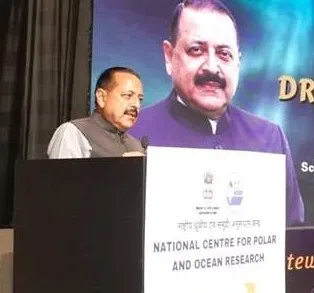Will India Play a Key Role in Ocean Geopolitics and Climate Action?

Synopsis
Key Takeaways
- India's role in ocean geopolitics is expanding.
- New facilities enhance research in polar and ocean sciences.
- Climate action is a priority in India's strategic initiatives.
- NCPOR is crucial for maintaining India's research footprint.
- International frameworks guide India's polar engagements.
New Delhi, May 22 (NationPress) India is set to assume a pivotal role in ocean geopolitics and tackle climate challenges, remarked Union Minister of State (Independent Charge) for Earth Sciences Jitendra Singh on Thursday.
During the inauguration of Sagar Bhavan and Polar Bhavan—two pioneering facilities in India and among the rare global establishments—at Goa's National Centre of Polar and Ocean Research (NCPOR), he emphasized the growing significance of polar and ocean studies.
Highlighting the escalating importance of ocean geopolitics in international relations, the Minister expressed confidence that these institutions will bolster “India's expanding role in geopolitics and allow the nation to take on a significant position in ocean geopolitics.”
Moreover, he mentioned that the new facilities will empower the institute to excel in meteorological studies and effectively address climate concerns.
Polar Bhavan, now the largest structure at the NCPOR campus, covers 11,378 square meters and was developed at a cost of Rs 55 crore. It comprises laboratories dedicated to polar and ocean research, 55 accommodations for scientific staff, a conference room, a seminar hall, a library, and a canteen. The facility includes the newly launched SOS unit and will ultimately host India's inaugural Polar and Ocean Museum.
Sagar Bhavan, with an area of 1,772 square meters, was constructed for Rs 13 crore. It features two ice core laboratories maintained at minus 30 degrees Celsius and +4 degrees Celsius storage units for preserving sediment and biological specimens.
The building also consists of 29 rooms, including a metal-free Class 1000 clean room for trace metal and isotope examinations.
Singh remarked that the establishment of these facilities positions NCPOR among a select few institutions with comprehensive polar and ocean research capabilities. He underscored that the institute’s scientific endeavors are not just regionally pertinent but also globally impactful, considering the transboundary aspect of polar phenomena.
He further acknowledged NCPOR’s contribution to sustaining India’s research footprint in crucial areas, including Antarctica (with stations Maitri and Bharati), the Arctic (Himadri), and the Himalayas (Himansh).
“Institutions like NCPOR will be vital to India’s scientific and strategic initiatives, especially in light of the government’s vision for a Viksit Bharat by 2047,” Singh stated.
The Minister also referenced India’s Arctic Policy (2022) and the Indian Antarctic Act (2022) as frameworks guiding science-led, environmentally conscious engagement in polar territories.
He noted that the Indian Antarctic Act provides the legal basis for India’s activities in the region, aligning with international obligations and standards.
In recent years, India’s polar research has broadened its geographic and temporal reach, with missions now exploring the Canadian Arctic, Greenland, and Central Arctic Ocean throughout different seasons.
Singh emphasized the necessity for strategic, science-driven participation in global climate and ocean initiatives.










